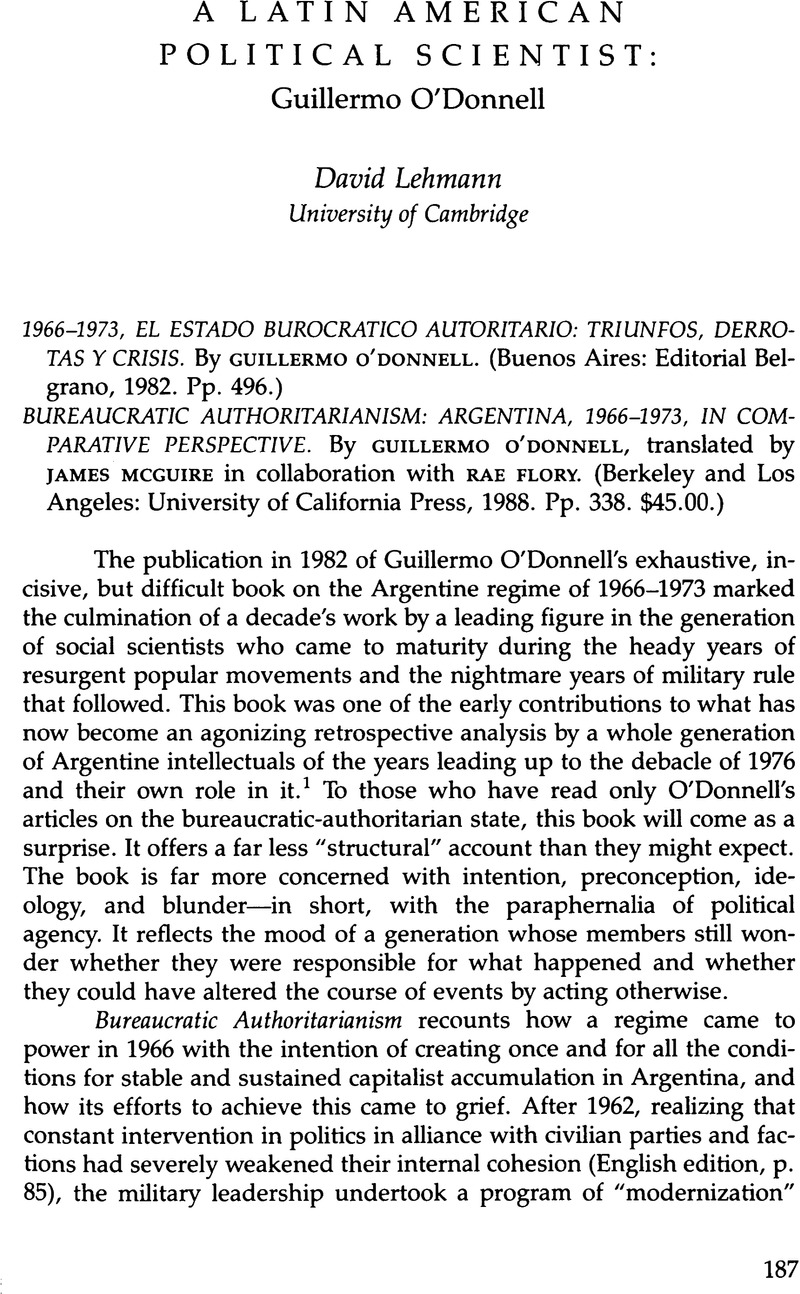Article contents
A Latin American Political Scientist: Guillermo O'Donnell
Review products
Published online by Cambridge University Press: 12 October 2022
Abstract

- Type
- Review Essays
- Information
- Copyright
- Copyright © 1989 by the University of Texas Press
References
Notes
1. In more recent papers, now written directly about the infinitely more murderous period after 1976, O'Donnell has begun to delve deeper into the private experiences—indeed the privatization of experience—especially among the intelligentsia during the unlamented regime of Videla-Viola-Galtieri. See his “Democracia en la Argentina, micro y macro,” in “Proceso,” crisis y transición democrática, edited by Oscar Oszlak (Buenos Aires: Centro Editor de América Latina, 1984). The main organs of post-Marxist and post-Peronist expression are Ciudad Futura, Punto de Vista, and (for the Peronists) Unidos. It is a measure of the atmosphere prevailing in the historic left that a sociologist noted for his Marxist positions in the 1960s told me in December 1986 that the only ideological innovation now is on the neoconservative side, whose political expression is the tiny “Centro Democrático” led by Julio Alsogaray. The intellectual supporters of military intervention in the 1970s, it should be added, are not reappraising anything, at least not in public.
2. O'Donnell describes this program in detail in Modernization and Bureaucratic Authoritarianism, Politics of Modernization Series (Berkeley: University of California, 1971); and in “Modernización y golpes militares,” Desarrollo Económico 47 (Oct.–Dec. 1972). Unless otherwise stated, all page references are to the English edition of Bureaucratic Authoritarianism.
3. The metaphor is taken from O'Donnell's earlier paper, “State and Alliances in Argentina,” Journal of Development Studies 15, no. 1 (Oct. 1978).
4. In particular, see Karen L. Remmer and Gilbert W. Merkx, “Bureaucratic Authoritarianism Revisited,” LAR 17, no. 2 (1982).
5. The translation under review has “amalgamation with the state.”
6. I mean a commune in the sense of the Paris commune, not its more modern versions.
7. This description of the contents of the table is necessarily simplified.
8. There are three basic and well-known papers: “Corporatism and the Question of the State,” in Authoritarianism and Corporatism in Latin America, edited by James Malloy (Pittsburgh: University of Pittsburgh Press, 1976); “Reflections on the Patterns of Change in the Bureaucratic-Authoritarian State,” LAR 13, no. 1 (1978); and “On the Characterization of Authoritarian Regimes,” in The New Authoritarianism in Latin America, edited by David Collier (Princeton, N.J.: Princeton University Press, 1970).
9. “Reflections on the Patterns of Change in the Bureaucratic-Authoritarian State.”
10. See “Reflections on the Patterns of Change in the Bureaucratic-Authoritarian State”; and specifically, “State and Alliances in Argentina.”
11. See “State and Alliances in Argentina.”
12. See “Corporatism and the Question of the State.”
13. “Apuntes para una teoría del estado,” Revista Mexicana de Sociología 1 (1979); it was also a CEDES mimeo, Buenos Aires, 1977.
14. “Corporatism and the Question of the State.”
15. See his Modernization and Bureaucratic Authoritarianism: Studies in South American Politics, Studies in Comparative Politics no. 9 (Berkeley: University of California, Institute of International Studies, 1973).
16. It is worth recalling that O'Donnell was something of a child prodigy in Argentine politics, rising through the ranks of anti-Peronist student politics to take the extremely important post of Sub-Secretario del Interior in 1963, the youngest vice-minister in the country's history. Although the appointment did not last long, it was long enough for him to become acquainted with most of the prominent personages in this book. Thus his insights are not a matter of mere sociological training, or if they are, it was a very privileged sort of training.
17. This circumstance is explained in the first footnote to “Democracia en la Argentina, micro y macro.”
18. ¿Ya mi que me importa? Notas sobre socialibilidad y política en Argentina y Brasil (Buenos Aires: CEDES, 1984); and “On the Fruitful Convergences of Hirschman's Exit, Voice, and Loyalty and Shifting Involvements: Reflections from Recent Argentine Experience,” in Development, Democracy, and the Art of Trespassing, edited by Alejandro Foxley, Michael McPherson, and Guillermo O'Donnell (Notre Dame, Ind.: University of Notre Dame Press, 1986).
- 1
- Cited by




